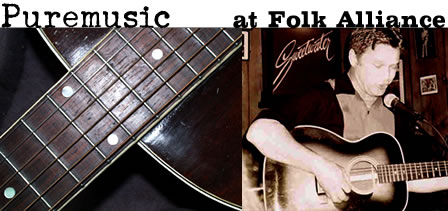
Interview with Arthur Godfrey (continued)
PM: Since many of our readers are themselves songwriters, many will want to know: "Who is Arthur Godfrey, anyway?" So let's tell them, where you came from, and where you're coming from.
AG: Well, I'll give you some press that tells you a lot about my background, and you can share what you think is appropriate. I will tell you that I don't do the pretty boy thing. I'm more often compared to Tom Waits, Bruce Springsteen, Joe Cocker sort of thing. [My mind reeled, trying to draw a quick parallel between these three characters.] Besides my own songs, the songs I sing are Woody Guthrie, John Prine, Townes Van Zandt -- real songs about real people. I've been playing music all my life, from being a choir soloist at Symphony Hall as a youngster to playing in bands through high school and college at Kent State. Went in the service at 17, out before I was 21. Married and divorced, three beautiful daughters, two in college. The other one is 16, lives with her mom. I'm 46, I've worked for the Post Office for 18 years, seven facilities in three states. I've been a Postmaster most of that time, I'm retiring pretty soon, and my house is paid for. I used to run large facilities, and seven years ago I took a small Postmaster's job in New Harbor, Maine. It's a beautiful seaside town.
I have over 75 copywritten tunes. I took my catalog of songs and started performing. I've been playing the same club up there, a high scale club I played every Friday night. I've been playing solo for four years, just honing my craft. Now I'm fortunate to have a good band in CA, and play many solo gigs as well. My point is that I stopped playing in bands and played solo for four years, to get back into the groove and pulse of writing and singing and who I am on stage. I come at you like a freight train. I'm soaking wet ten minutes after I hit the stage. I throw down, case closed. And that's what makes me different from the other solo acts out there, and even songwriters with bands behind them.
I met my current wife, Laurie, she was from CA. Her parents have a vacation home in Maine. Three years ago, we came out for a trip to Prunedale, CA, between Monterey and Santa Cruz. It's a real hotbed for Americana music because of KPIG, which is the world's largest Internet radio station as well as a long established station in this area [see our story on the recent Americana Conference].
PM: Sure, I'm an old Bay Area guy, I'm familiar with KPIG.
AG: My sponsor there is a woman named Arden Eaton. She's the CA Americana representative. She and John Sandidge of Snazzy Productions [also a KPIG personality] have been very good and helpful to me. He booked me at the Strawberry Festival and with Sonia Dada and Zigaboo Modeliste. Anyhow, I moved out there and started getting airplay on KPIG, and generated a lot of attention. A couple of weeks later, Norton Buffalo got involved, through my KPIG friend Dave Nielsen, who engineered my record East Side of Town. My goal with that record was to crack the Americana market. All of the songs on the CD are one or two takes, no ProTools, no electric guitars. I wanted the lyrics and the songs to be totally audible and understandable.
Anyhow, I'm down here meeting with EMI, ASCAP, and a major Indie label, hoping to do some business. They're very interested in the record, don't want to record anything over or do other art, they like it just the way it is. I love the art, it's by John Johnson. He does all the KPIG art. I wanted to incorporate a city scene and add a little of the Far Side vibe. [Here we got into a discussion of various folk labels.]
As corny as it may sound, my true goal was to crack the Americana market. I work 18 hours a day, and I wrote 500 letters by hand to the DJs that were playing me. I mean stamped and posted letters now, not emails. I like emailing too, but there's something about getting a letter that still means more, it's not just that I'm also a postal employee. When I went to the Americana Conference, I absorbed the expense of everyone receiving a CD of mine in their registration bag. I prepared 750 press kits to go in those bags. When I came to Folk Alliance, that meant 1800 CDs to go in the bags. [That's over a three grand investment right there, CDs in every registration bag at those two shows.] You know, if you don't do nothin, you don't do nothin.
I really believe in myself. I'm the hardest worker I know, and one of the best songwriters. There's a craft to it, and it takes a long time to hone it, and I work really hard at it. And if people hadn't been saying all along that they were really touched by the songs, I wouldn't be wasting their time with it. I must be doing something right, I'm winning some awards. And if you treat people like you want to be treated, I think it comes back to you. And you just prepare the best you can and to whatever extent you can afford, and do absolutely everything you can do to make it happen. When I left the Americana Conference, I knew I'd done 100% of what I could do there, and that's how I'll feel leaving Folk Alliance, too. So I feel like a winner, regardless. continue
listen archives artists a-z puremusic home